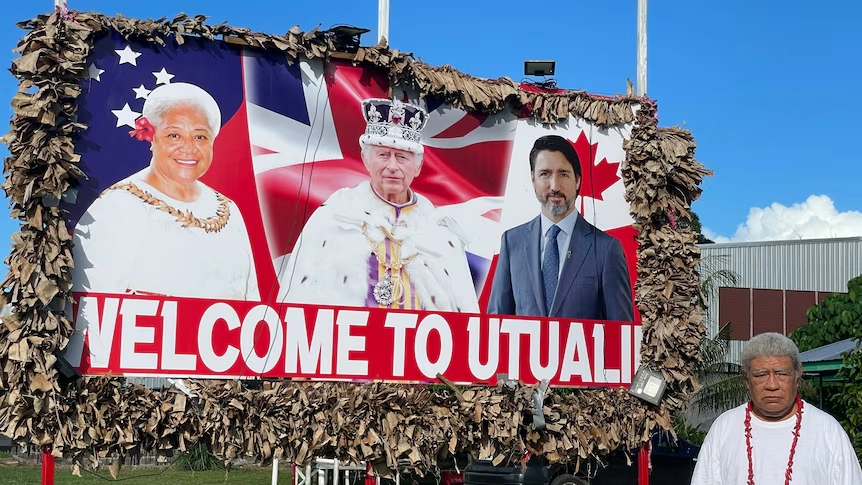Samoa is on the brink of hosting what could well be the largest event in its history.
And preparations are in their final stages right across the Pacific Island nation’s green undulating hills and neat-as-a-pin villages.
The gathering in question is the Commonwealth Heads of Government Meeting (CHOGM), and the task is formidable.
Samoa, with a population of 220,000, will this week welcome three monarchs, dozens of leaders and more than 4,000 officials, diplomats and assorted hangers-on from across the Commonwealth — a sprawling group that encompasses 56 member nations with a combined population of 2.6 billion.
Journalists from more than 150 media organisations will also descend on Apia.
Even high-profile billionaire Elon Musk might make an appearance.
Unsurprisingly, the influx will overwhelm Samoa’s hotel capacity, which means the huge Pacific Explorer cruise ship will dock on Apia’s harbourside to help house the swelling multitude of guests.
Much of the media focus at CHOGM will inevitably be on King Charles, who will preside over the meeting in Apia after concluding his visit to Australia, despite an ongoing battle with cancer.
It will be the first time he’ll attend CHOGM as head of the commonwealth.
But that shouldn’t eclipse just how large this meeting looms in Samoa itself, and how deeply invested many people are in making sure it’s a success.
This will be the first CHOGM to be hosted by a Pacific country (excluding Australia and New Zealand) and Samoa’s government has poured huge quantities of time and effort into the meeting, mobilising ordinary people in villages across the country in a truly national campaign.
Preparations across the country
While most of CHOGM’s main events will be hosted in central Apia, Samoa’s government is determined to take visitors out of the capital and into its hinterlands.
Every commonwealth country delegation has been “assigned” a village, which have been decked out in that country’s national flags and other paraphernalia.
Delegations are then firmly encouraged to pay a visit and meet locals.
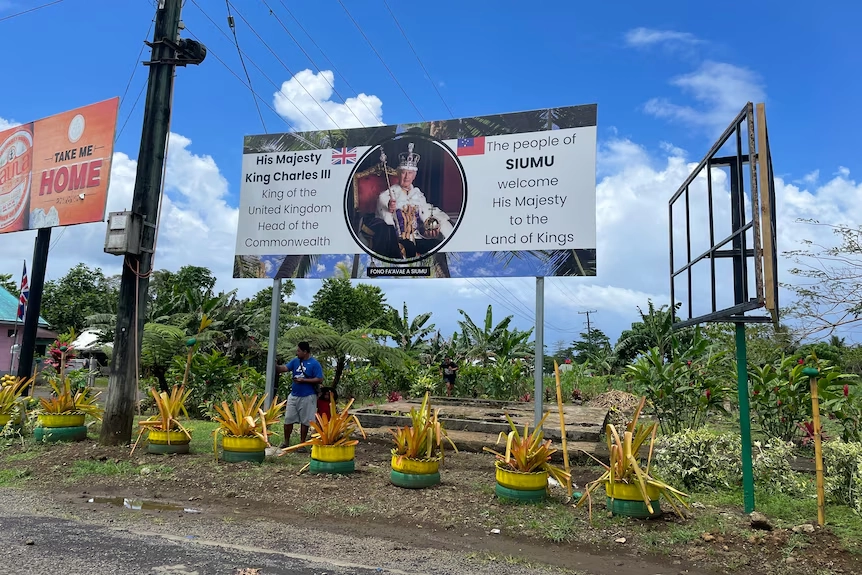
It’s classic soft diplomacy — with an eye to bolstering tourism by drawing eyeballs and cameras from across the world into its heartland.
The ABC visited the village of Utualii, which has been emblazoned with Canadian and Samoan flags, as well as a billboard showing Canada’s Prime Minister Justin Trudeau next to King Charles and Samoa’s Prime Minister Fiame Naomi Mata’afa.
The village council head Tulimasealii Samasoni Pomare told the ABC — with perhaps a touch of ruefulness — that the scale of the operation took them slightly by surprise.
“Initially, we didn’t fully grasp the scale of this honour,” he says.
But as the big week looms, he seems genuinely excited by the prospect of the influx of people.
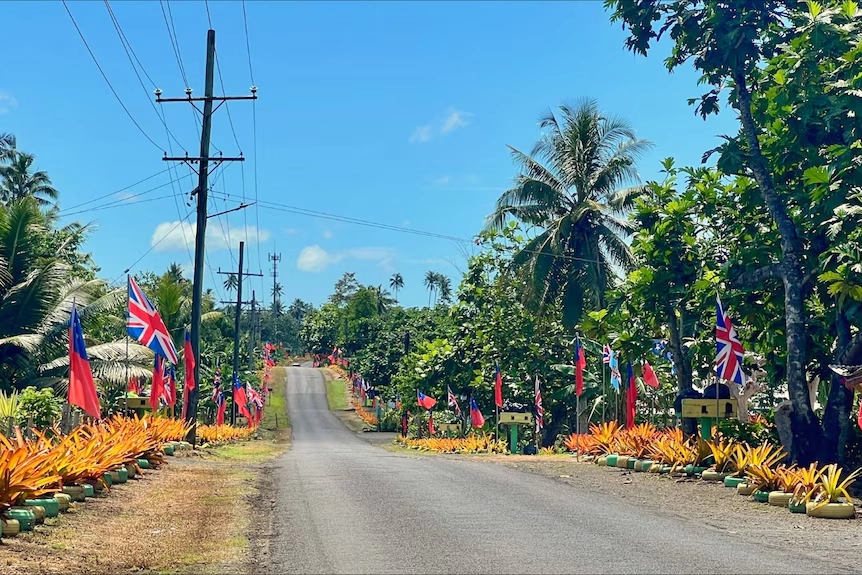
The village has been picked clean of any rubbish, while Canadian journalists have already visited to film the village in all its finery.
And he’s hoping — or perhaps expecting — that the Canadian delegation will also show up later this week for a visit.
“As you can see, all the houses are shining … as has been requested by the Samoan government,” he says.
“Decorations have been meticulously arranged.”
In the nearby village of Laulii, 71-year-old Gaupule Saufoi tells the ABC she feels a “deep sense of joy” at the prospect of Samoa hosting the global meeting.
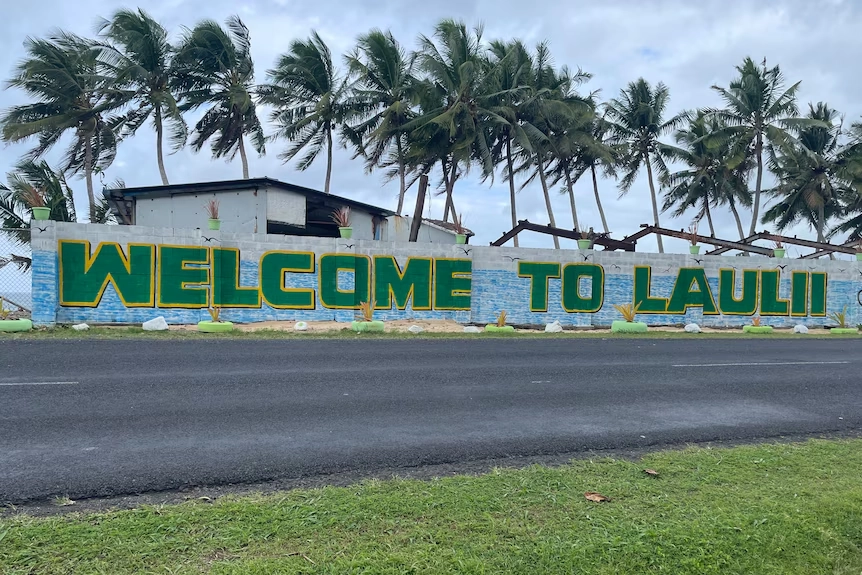
“Who is Samoa, that the entire world would come to visit? The world is vast, yet Samoa has been given this incredible opportunity,” she tells the ABC.
“We are proud, and I am personally grateful to be alive to witness this moment.”
Of course, the anticipation is also tinged with some uncertainty.
Understandably, Samoa remains particularly sensitive about the threat of disease, particularly in the wake of a devastating measles outbreak in 2019.
The influx of VIPs and VVIPs with their trailing motorcades will also put a strain on police unaccustomed to dealing with the demands of such a major summit.
More than 200 officers from New Zealand, Australia and no fewer than nine other Pacific nations will also be on the ground as a “Pacific Police Support Group” — the first manifestation of the Pacific Policing Initiative endorsed by regional leaders in Tonga.
New Zealand, Australia and the United Kingdom will all deploy vessels to the country to help provide maritime security.
Road closures and other security measures could create frustrations on the ground for locals, although police and the government are calling for patience and understanding.
A spokesperson for Australia’s Department of Foreign Affairs and Trade told the ABC that it was proud to help Samoa host a “uniquely Pacific” CHOGM.
“In response to Samoa’s requests, and in close coordination with other Pacific partners including New Zealand, we have provided a broad package of support covering security, policing, cybersecurity, emergency response and logistics,” they said.
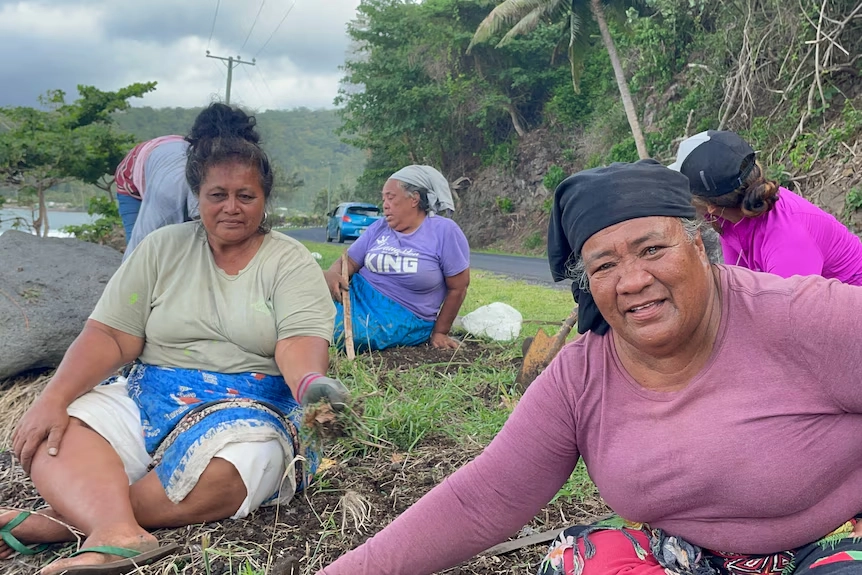
Is CHOGM still relevant?
The genuine excitement in Samoa about the gathering could well give this CHOGM a shot of energy, but it won’t eliminate lingering questions about its broader purpose and future.
The commonwealth has its roots in the British Empire, and every CHOGM inevitably reanimates the perennial debate about the association’s place in the modern world, and how it can retain its relevance.
Commonwealth officials could brush off these questions.
They can point out the commonwealth is growing, not shrinking — most recently the former French territories of Togo and Gabon joined in 2022.
They can also point to the work that the commonwealth has done to help its members access climate finance as proof that it’s ready to tackle the most pressing contemporary challenges.
And while the commonwealth isn’t a trading bloc, its Secretary-General, Patricia Scotland, told the ABC’s The Pacific that flourishing trade ties between member countries prove its enduring value.
“Inter commonwealth trade is expected to reach $1 trillion by 2026 and $2 trillion by 2030,” she said.
“Commonwealth countries trust each other, because we have the same law, because we have the same parliaments, because we have the same language, the same approach.
“So this is concrete, absolute provable advantage that we all have in just the fact that we can work together.”
None of that means that CHOGM won’t grapple with questions around colonialism and the legacy of empire.
For example, all three of the candidates to replace Patricia Scotland as secretary general — who are all from Africa — have championed the idea of either financial reparations for countries that suffered under slavery or colonisation.
But the debates around the legacy of slavery, colonialism and the British crown tend to be much more muted in the Pacific than they are in some Caribbean and African nations.
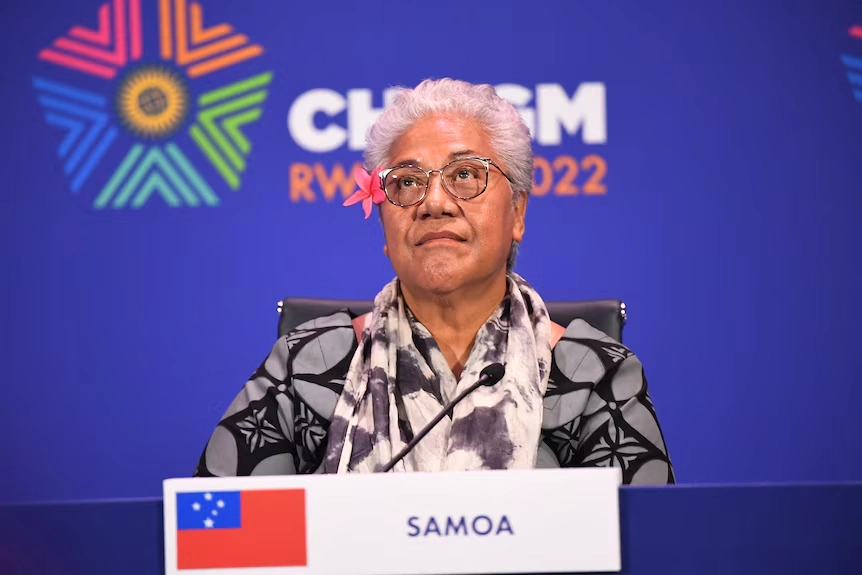
On the agenda
One issue that will be right at the foreground and sharply in focus is climate change, as well as the fate of global oceans.
The bulk of commonwealth members are developing countries, and its membership includes a host of small island nations from both the Caribbean and the Pacific — which remain some of the most exposed to the cascading impacts of climate change.
Many of these governments remain deeply frustrated that they’re still struggling to get access to the climate finance they need to deal with climate disasters and environmental ruin.
They’re expected to endorse an Ocean Declaration, which “aims to accelerate initiatives for a healthy, sustainable and resilient ocean”.
King Charles has also been a vocal advocate for urgent climate action for decades, although he’s been understandably more muted since ascending the throne.
Still, as the monarch presiding over CHOGM, he’s likely to take the opportunity to put climate catastrophes front and centre.
Ahead of the meeting, Prime Minister Fiame told media that her country was determined to do everything possible to ensure CHOGM was a spur to climate action, while helping commonwealth nations share information about dealing with its impacts.
“The commonwealth has always championed and advocated for the interests of small states,” she said last week.
“Everyone is impacted by climate change, and we see value in how other countries are adapting, mitigating and responding to the climate crisis.”
On Friday, she told journalists that her nation was in the grips of the “final countdown” for the massive event.
“We come to seek God’s blessings … that it will be a successful meeting,” she said.
“And that their visitors will … not only have a good meeting, but also … have the opportunity to experience our Blue Pacific and the situation we find ourselves in.”
“We ask for your prayers as we go forward.”
This article was originally published on ABC Australia.



